Here are a few books/blogs/news feeds, etc. I highly recommend indulging in. Please feel free to leave any comments on them below.
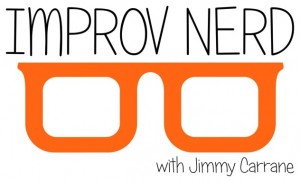 Improv Nerd by Jimmy Carrane
Improv Nerd by Jimmy Carrane
Jimmy Carrane is the co-author of “Improvising Better: A Guide to the Working Improviser.” He is the host of Studio 312 on Chicago Public Radio. He has taught at The Second City, IO-Chicago, The Annoyance and Victory Gardens. Jimmy was recently seen in the films “LOL” and “Public Enemies” with Johnny Depp. His other film and TV credits include “ER,” “Natural Born Killers,” “Early Edition,” “The Untouchables,” “Stash” and “Tapioca.” He was an original member of The Annoyance Theater, Armando at The IO-Chicago and was a member of Carl and The Passions. He currently performs with Burning Desires. He has performed in some of Chicago most innovative and ground-breaking long-form improv shows, such as “Jazz Freddy” and “Naked” (a two-person one-hour improvised scene with MAD TV’s Stephanie Weir.) Other theater/improv credits include: “I’m 27, I Still Live at Home and Sell Office Supplies,” “Godshow,” “Every Old Man,” “Living in Dwarf’s House” and “Summer Rental” at The Second City etc.
Read the whole site, but keep up on the blog: http://www.jimmycarrane.com/index.php/blog
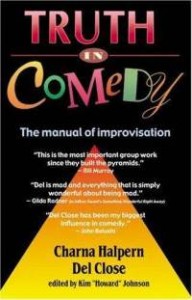 The Art in Truth in Comedy by Charna Halpern and Del Close
The Art in Truth in Comedy by Charna Halpern and Del Close
The ‘Harold’, an innovative improvisational tool, helped many actors on the road to TV and film stardom, including George Wendt (Norm on Cheers). Now it is described fully in this new book for would-be actors and comics. The ‘Harold’ is a form of competitive improv involving 6 or 7 players. They take a theme suggestion from the audience and ‘free associate’ on the theme into a series of rapid-fire one-liners that build into totally unpredictable skits with hilarious results. The ‘Harold’ is a fun way to ‘loosen up’ and learn to think quickly, build continuity, develop characterisations and sharpen humour.
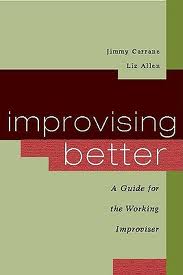 Improvise Better by Jimmy Carrance and Liz Allen
Improvise Better by Jimmy Carrance and Liz Allen
Improvising Better is an easy to read self-help book created with the new generation of improviser in mind. It’s written for today’s performers, looking for a quick fix to their performance problems. This book is a fast read with long-lasting results.
Jimmy Carrane and Liz Allen have improvised, taught, and directed in Chicago for over 30 combined, and have either seen or experienced the most common problems facing improvisers today. This book addresses the improviser as a whole, including how offstage issues affect onstage performance. Speaking candidly about this very personal art form, Carrane and Allen offer common-sense solutions, some tough love, and a little inspiration along the way.
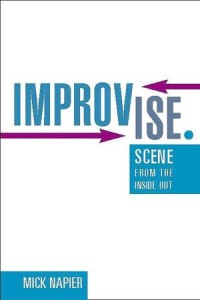 Improvise: Scene From The Inside Out by Mick Napier
Improvise: Scene From The Inside Out by Mick Napier
For more than 20 years of directing, teaching, and participating in improvisation, Mick Napier has watched thousands of scenes.
In this book, Napier takes an irreverent, but constructive look at the art and practice of improvised scenes. He covers such topics as two-person scenes, group scenes, entering scenes, techniques to achieve richer, more layered scenes, auditioning and solo exercises for practice at home.
Napier also challenges the conventional wisdom of the rules of improvisation, examining what’s behind them and how they came to be in the first place. Get helpful, tangible guidelines for bringing strength and direction to your scenes. Just Improvise.
 The Art of Learning by Josh Waitzkin
The Art of Learning by Josh Waitzkin
In his riveting new book, The Art of Learning, Waitzkin tells his remarkable story of personal achievement and shares the principles of learning and performance that have propelled him to the top — twice.
The Art of Learning takes readers through Waitzkin’s unique journey to excellence. He explains in clear detail how a well-thought-out, principled approach to learning is what separates success from failure. Waitzkin believes that achievement, even at the championship level, is a function of a lifestyle that fuels a creative, resilient growth process. Rather than focusing on climactic wins, Waitzkin reveals the inner workings of his everyday method, from systematically triggering intuitive breakthroughs, to honing techniques into states of remarkable potency, to mastering the art of performance psychology.
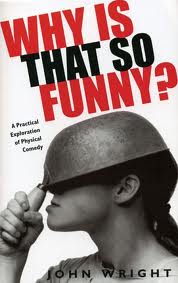 Why is That Funny? by John Wright
Why is That Funny? by John Wright
This unique exploration of the principles and practice of physical comedy starts with a discussion of the various types of laughter that can be provoked by performance. It then presents graduated sequences of over a hundred games and exercises devised to demonstrate and investigate the whole range of comic possibilities open to a performer. The result is an intensely practical and thoroughly stimulating investigation of how comedy works in physical terms.





